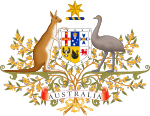 The Cabinet Room in Parliament House | |
 | |
| Formation | 1 January 1901 |
|---|---|
| Legal status | By convention |
| Purpose | Chief decision-making body of the Australian Government |
| Location |
|
| Anthony Albanese | |
Current Cabinet | Albanese Ministry (since 1 June 2022) |
Membership | 23 Cabinet ministers (maximum of 30 by legislation) |
| Website | www |
| This article is part of a series on the |
| Politics of Australia |
|---|
 |
| Constitution |
|
|
The Cabinet of Australia,[a] also known as the Federal Cabinet, is the chief decision-making body of the Australian government. The Cabinet is selected by the prime minister and is composed of senior government ministers who administer the executive departments and ministries of the federal government.
Ministers are appointed by the governor-general, on the advice of the prime minister, who is the leader of the Cabinet. Cabinet meetings are strictly private and occur once a week where vital issues are discussed and policy formulated. There are several Cabinet committees focused on governance and specific policy issues, with administrative support provided by the Department of the Prime Minister and Cabinet. The outer ministry consists of junior ministers outside of Cabinet. There are also a number of assistant ministers (designated as parliamentary secretaries under the Ministers of State Act 1952),[3] responsible for a specific policy area and reporting directly to a senior Cabinet minister of their portfolio. The Cabinet, the outer ministry, and the assistant ministers collectively form the full Commonwealth ministry of the government of the day. Officials and advisors are not allowed to attend Cabinet, with only Cabinet ministers and the three official note-takers that produce Cabinet minutes able to be present during deliberations.
The Cabinet is a product of convention and practice. There is no reference to the Cabinet in the Australian Constitution and its establishment and procedures are not the subject of any legislation. The prime minister of the day determines the shape, structure and operation of the Cabinet and its Committees.
Decisions of Cabinet (formally known as Cabinet minutes) do not in and of themselves have legal force, requiring the endorsement from individual ministers, holders of statutory office, Parliament or the governor-general as advised by the non-deliberative Federal Executive Council—the highest formal executive body mentioned in the Constitution. In practice, the Federal Executive Council meets solely to endorse and give legal force to decisions already made by the Cabinet.
Cite error: There are <ref group=lower-alpha> tags or {{efn}} templates on this page, but the references will not show without a {{reflist|group=lower-alpha}} template or {{notelist}} template (see the help page).